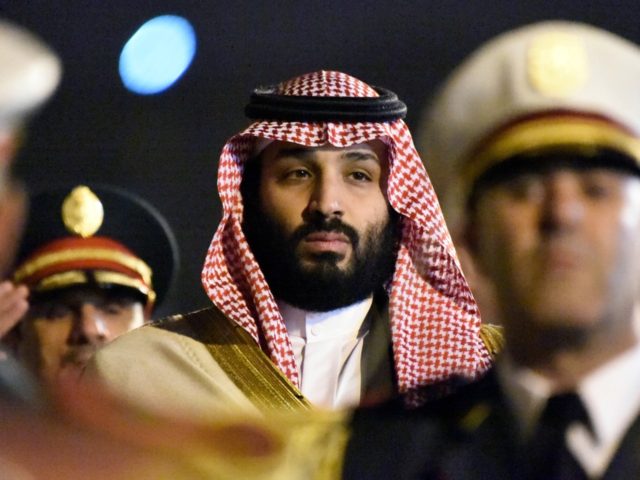Saudi Crown Prince Mohammed bin Salman (MBS) asked South Korean President Moon Jae-in for help in crafting an air defense system to prevent future attacks such as the drone strikes on Saudi oil facilities that occurred this weekend, Seoul revealed.
MBS, as the crown prince is more commonly known, reportedly made the request in a phone conversation with Moon on Thursday, according to the South Korean news service Yonhap, which cited the Blue House, South Korea’s presidential offices. Saudi Arabia has been working to expand connections to allies in light of drone strikes on oil refining facilities owned by Aramco, the Saudi state oil company. Yemen’s Shiite Houthi jihadists took credit for the attack, but both Saudi and American officials believe that the government of Iran is responsible for the bombings.
Iranian officials have denied perpetrating the attack, but nonetheless celebrated the Houthis.
The Iranian Islamic regime is a close ally of the communist rulers of North Korea, who regularly threaten to invade and conquer South Korea. Both Iran and North Korea have spent years illegally pursuing nuclear weapons development.
“The attack on Saudi oil facilities represents a threat to security not only in South Korea but also in the whole world, and the international community needs to deal resolutely with the issue,” Yonhap quoted Moon telling MBS in their phone conversation Wednesday, noting that any drop in Saudi oil production would significantly damage the Korean economy, as Riyadh is the top oil exporter to South Korea. MBS reportedly assured Moon that Saudi Arabia would be able to produce enough oil to keep the South Korean market supplied.
Given Seoul’s dependence on Saudi oil and the two countries’ shared alliance, Yonhap reported that MBS “requested South Korea’s help in a plan to beef up his nation’s air defense system and the two sides agreed to continue consultations on it.”
South Korea and the United States are close allies, still technically embroiled in the nearly 70-year-old Korean War against China and South Korea. Washington has issued a stern response to the attacks on the Saudi oil facilities throughout the week, and President Donald Trump sent Secretary of State Mike Pompeo to Saudi Arabia to discuss a response.
In Jeddah, Saudi Arabia, on Wednesday, Pompeo insisted that the attack was the work of Iran, not the Houthi movement in Yemen, although the Houthis publicly took credit and have targeted civilian Saudi sites such as airports in the past. Pompeo called the Houthi claim “fraudulent” and the bombing an “act of war” by Iran.
In remarks Wednesday, Saudi military officials corroborated Pompeo’s words, stating that the damage done indicates that the drones did not come from locations known to have any significant Houthi presence.
Saudi military spokesman Col. Turki al-Malki told reporters the drones “came from the north,” indicating Iran launched them; Yemen is to the south of Saudi Arabia.
Iranian officials have flatly denied any involvement in their attack while failing to contain their approval of it.
“The Yemenis did not hit a school, a hospital or a market, but attacked an industrial center to warn their enemies,” Iranian President Hassan Rouhani said on Tuesday, according to state media. Rouhani blamed Israel, the American government, and Saudi Arabia itself for the attack.
“Despite lack of equipment, Yemen has smart people. They adopted a clever retaliatory measure in recent days and used their right to self-defense,” Alaeddin Boroujerdi of the Iranian Parliament’s National Security and Foreign Policy Commission said in response to claims that the Iranian regime committed the attack. “Yemen’s measure was a reaction to various illegal actions and war crimes of Saudi Arabia and had nothing to do with the Islamic Republic of Iran.”
Saudi Arabia has not formally responded to either the Houthis or Tehran following the attack, instead reaching out to allies and having spokesmen tell reporters that they are still investigating the precise nature of the attack. On Wednesday, however, the state-run Saudi news agency al-Arabiya reported that Saudi fighter jets had begun targeting Iranian assets in Syria, where the Islamic regime helps prop up dictator Bashar al-Assad.

COMMENTS
Please let us know if you're having issues with commenting.